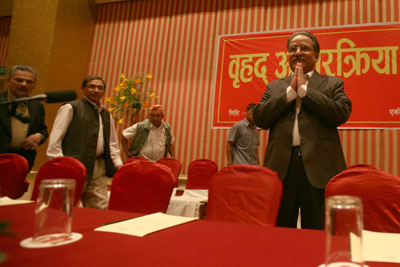 KIRAN PANDAY GREETINGS: Pushpa Kamal Dahal came to intellectuals open-armed and thick-skinned, Yak&Yeti, Wednesday |
Addressing a gathering of intellectuals at the Yak & Yeti on Wednesday, Dahal said his party was open to discussion on the conditions put forward by the government. "We are ready to keep the combatants under the supervision of the Special Committee and conclude the integration and rehabilitation process within four months before UNMIN's term expires," he said.
Dahal also said his party was ready to dismantle the YCL within four days, return confiscated private property, form a Truth and Reconciliation Commission to look into cases of disappearances, and resolve disputes in constitution writing. Apparently, the ball is now firmly in the government's court.
Not so fast, warns TU professor of political science Kapil Shrestha. "This was a stage-managed show, with certain intellectuals hand-picked to speak, to whom Prachanda could make promises. The Maoists are not sincere or trustworthy, and the government will not feel pressured in any way."
But though Madhav Nepal is still resisting the Maoist demand for a national unity government before integration, he should keep in mind that he will need a two-thirds majority even to amend the Interim Constitution to extend the CA.
This means the government will have to compromise with the Maoists at some point, whether it desires to continue in power or announce fresh elections. The latter is highly unlikely of course, and everyone seems agreed on the need for CA extension.
What is holding up a deal then, despite repeated assurances on the part of politicians that a deal is imminent?
The non-Maoist parties believe the constitution cannot be written under the shadow of the gun, that is, the PLA. This is why they have consistently advocated for integration at the earliest. "We should be assured that the Maoist party is detached from its combatants," says UML leader Pradeep Gyawali. "Everything they have done so far, including their contributions to constitution writing, indicates that the Maoists still want to establish an authoritarian people's republic."
NC leader Ram Saran Mahat, who is also on the Special Committee on PLA integration, agrees. "The integration process should be started for our satisfaction," he says. "The Maoists should be divested of arms and armaments first, then we can discuss the issues, including the formation of a new government."
In fact the deadline for the integration process passed on the watch of the Maoist-led government. This has convinced the other parties that the Maoists are not serious about relinquishing their hold on the PLA.
For their part, the Maoists have been given ample room to suspect the intentions of the political parties. Defence Minister Bidhya Bhandari declared that the Nepal Army was not beholden to the decisions of the special committee, and Deputy Prime Minister Sujata Koirala too spoke out against federalism, which the Maoists hold dear.
Maoist nominee CA member Hari Roka emphasises that the PLA is the foundation on which the Maoist party and its achievements rest. "So it is only natural that the Maoists will try to keep the PLA or secure the best possible deal for them in terms of integration and rehabilitation," he says.
But Roka also notes the Maoists have realised nothing will happen on this count as long as they are not in government. They will have realised now that street protests are not enough to propel them into power. Thus their apparently newfound flexibility on the conditions laid out by the other political parties. Believe them or not, this may be one promise the Maoists will want to keep.
READ MORE:
Proximate breakthrough
Relief and despair - Publisher's note
Less revolting- By Kiran Nepal
Letting go - By Prashant Jha


